together




healthy
ADVANCED CARE FOR A HEALTHY HEARTBEAT ‘THE WOUND CARE CENTER GOT ME THROUGH’ CHRONIC FOOT PROBLEMS— SOLVED! Fall 2022A Publication of MONMOUTH MEDICAL CENTER SOUTHERN CAMPUS HELPING PATIENTS NAVIGATE CANCER
“Being recognized nationally for excellence is an important validation. That’s why I am delighted that Rutgers Cancer Institute of New Jersey together with RWJBarnabas Health achieved High Performing status in the adult specialty category for cancer in the most recent U.S. News & World Report Best Hospitals survey. This demonstrates the extraordinary, multidisciplinary care we provide for our communities, informed by groundbreaking cancer research, scientific leadership and transformational discoveries alongside exceptional patient experience.”
BARRY H. OSTROWSKY | Chief Executive Officer, RWJBarnabas Health


“As New Jersey’s largest and leading academic healthcare system, we pride ourselves on providing exceptional care for our communities together with our partners such as Rutgers Cancer Institute of New Jersey, the state’s only NCIDesignated Comprehensive Cancer Center. We congratulate Rutgers Cancer Institute on receiving the highest score in New Jersey in the adult specialty category for cancer in U.S. News & World Report’s annual Best Hospitals survey. This validates the exceptional level of cancer care we provide across our health system.”
MARK E. MANIGAN | President, RWJBarnabas Health
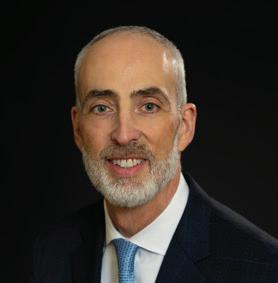
“At Monmouth Medical Center Southern Campus, we are proud of national and state recognitions of our programs and team members. Recently, our cancer program received accreditation from the Commission on Cancer of the American College of Surgeons in recognition of high-quality, patient-centered care. Additionally, team members have received prestigious statewide recognitions, including Jennifer Lees, Administrative Director of Emergency and Critical Care, who received the Clinical Nurse Leadership Award from the New Jersey Emergency Nurses Association, and Beth Meenan, a screener with Psychiatric Emergency Screening Services, who was honored as Provider of the Year by the New Jersey Crisis Intervention Team Center of Excellence.”
ERIC CARNEY | President and Chief Executive Officer, Monmouth Medical Center Southern Campus and Monmouth Medical Center
RWJBarnabas Health
@MonmouthSouthernCampus
KNOW THE SCORE ON HEART DISEASE RISK
Coronary calcium scoring is a simple, fast and safe imaging exam that uses computerized tomography (CT) to produce pictures of your coronary
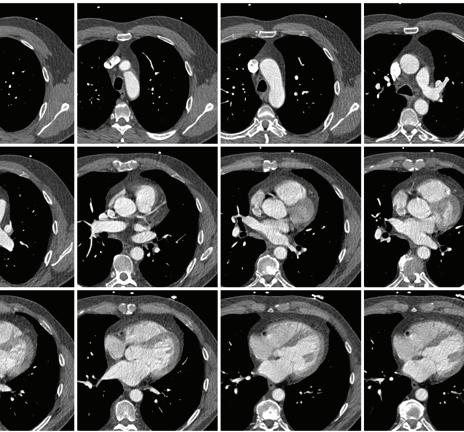
arteries and potentially predict heart disease before you experience symptoms. The test is often not covered by private insurance carriers or Medicare, but with a prescription from your doctor, you can receive this valuable test for only $49 at Monmouth Medical Center Southern Campus (MMCSC) and numerous other RWJBarnabas Health locations.
Images provided by coronary calcium scoring help determine if coronary arteries that supply your heart with oxygen-rich blood contain calcium deposits or plaques. These deposits often result from a buildup of fat or other substances and may indicate the presence of atherosclerosis, also called coronary artery disease. Left undetected, plaque buildups can narrow artery walls, leading to chest pain and even a heart attack.
To learn more or to find out if you’re a candidate for coronary calcium scoring due to risk factors such as high blood pressure and/or cholesterol, smoking, stress, a family history of heart disease, lack of physical activity, excess weight or obesity, or advancing age, call 866.675.3226
A LUNG TEST THAT DETECTS EARLY CANCER
Getting your lungs checked can be daunting, especially if you have a history of smoking. But not getting a test that can detect early stages of lung cancer—when cancer is most treatable—can be even scarier if the result is finding cancer at a more challenging point later. Undergoing a low-dose CT scan to detect early-stage lung cancer can increase the chances of a positive outcome by 20 percent or more over chest X-rays. An experienced lung nurse navigator at MMCSC can guide patients and their loved ones through testing and any other services that may be needed. Screening for qualified patients is often covered by Medicare and most insurance plans. To learn more, call 732.923.7966 or visit www.rwjbh.org/ lungscreeningsouth

CONNECT WITH US ON Monmouth Medical Center Southern Campus complies with applicable federal civil rights laws and does not discriminate on the basis of race, color, national origin, age, disability or sex. For more information, see link on our home page at www.rwjbh.org/monmouthsouth. MMCSC cumple con las leyes federales de derechos civiles aplicables y no discrimina por motivos de raza, color, nacionalidad, edad, discapacidad o sexo. ATENCIÓN: Si usted habla español, servicios de asistencia lingüística, de forma gratuita, están disponibles para usted. Llame al 732.363.1900. MMCSC konfòm ak lwa sou dwa sivil federal ki aplikab yo e li pa fè diskriminasyon sou baz ras, koulè, peyi orijin, laj, enfimite oswa sèks. ATANSYON: Si w pale Kreyòl Ayisyen, gen sèvis èd pou lang ki disponib gratis pou ou. Rele 732.363.1900. For issues regarding delivery of Healthy Together, please write to HTcirculation@wainscotmedia.com. 600 River Ave., Lakewood, NJ 08701 | 732.363.1900 | rwjbh.org/MonmouthSouth @MonmouthSouthernCampus @RWJBarnabas HEALTH NEWS
MESSAGES FROM LEADERSHIP
Healthy Together | 2 Fall 2022
healthy
18
2. WELCOME LETTER. A community update from our leadership.
4. THE BEAT IS ON. How advanced cardiology can correct abnormal heart rhythms.
6. BENEFITING FROM CLINICAL TRIALS. Why participating is important to two patients—and others in the future.
8. MODELS OF LEADERSHIP. Supporters are named as honorees for an MMCSC gala event.
10. COPING WITH HOLIDAY DEPRESSION. How to move through the melancholy that often comes with the holidays.
12. NAVIGATING YOUR CANCER JOURNEY. RWJBH’s Nurse Navigation Program provides support, guidance and compassion.
14. ONE STEP AT A TIME. How the physical therapy team at Children’s Specialized Hospital helped a boy with spina bifida.
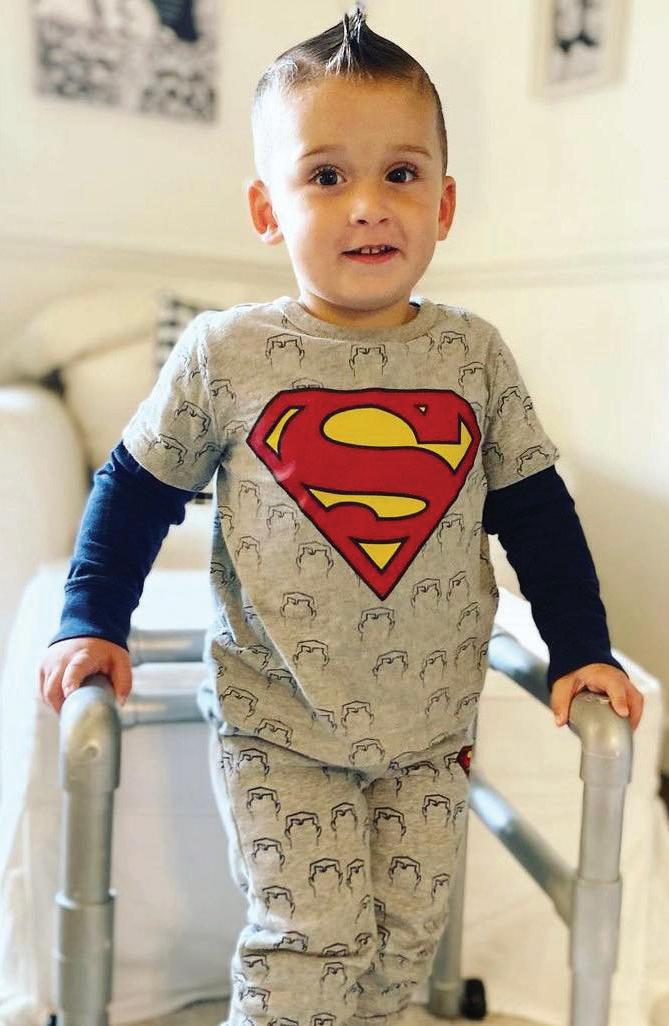


16. THE LOWDOWN ON LOWDOSE ASPIRIN. The latest guidelines for heart attack and stroke prevention.
17. CONNECTED TO THE COMMUNITY. MMCSC experts share knowledge.
18. ‘THE WOUND CARE CENTER GOT ME THROUGH.’ Specialized services treat a man’s foot wounds.
20. ‘SHE’S ONE OF A KIND.’ A geriatric provider helps a man care for his wife— and himself.
22. TAKING A GIANT STEP. Proper foot care resolves problems a woman had for years.
23. DO YOU NEED A MAMMOGRAM? What you need to know about screening.

20
contents FALL 2022
together 2322 4
14
Monmouth Medical Center Southern Campus RWJBH.ORG/MONMOUTHSOUTH 3
beat
The heart beats continuously about 100,000 times a day, pumping oxygen-rich blood through the body in a process so automatic that we scarcely think about it. But when the heart beats improperly, cardiac health quickly becomes top of mind.
For those times, an array of advanced cardiology services accessible at Monmouth Medical Center Southern Campus (MMCSC) can help monitor and correct an irregular heartbeat, or arrhythmia, along with underlying cardiovascular conditions.

“Our advanced practices allow
many patients with arrhythmias relief, often for the rest of their lives,” says Jonathan Tardos, MD, FACC, a cardiologist/ electrophysiologist at MMCSC. “You shouldn’t have to modify your lifestyle to accommodate an arrhythmia. Our goal is to modify or cure your arrhythmia so you can live the life you want.”

Methods that can monitor cardiac health and maintain a normal heartbeat include:

CARDIOVERSION: This procedure uses bursts of electrical energy to shock the heart and restore normal heart rhythm, which can become disrupted by electrical abnormalities in conditions such as atrial fibrillation. “It’s like a reset button for the heart rhythm,” says Dr. Tardos.
Whoever your heart beats for, our hearts beat for you. To connect with a top cardiovascular specialist at Monmouth Medical Center Southern Campus, call 888.724.7123 or visit www.rwjbh.org/heart.
LOOP RECORDER: An implanted device continuously monitors and records your heartbeat and can detect brief or infrequent arrhythmias that a test like an electrocardiogram (EKG) might miss. It’s similar to a wearable Holter device, but it reports data for years, not days.
PACEMAKER: A small device implanted in the chest delivers electrical impulses to ensure that signals flow properly between heart chambers so the heart maintains a normal beat. Pacemakers are often used to correct slow heartbeat that can cause symptoms such as fatigue, lightheadedness or shortness of breath.

JONATHAN TARDOS, MD, FACC
THE
IS ON HOW ADVANCED CARDIOLOGY CAN CORRECT ABNORMAL HEART RHYTHMS Healthy Together | 4 Fall 2022
WHAT IS A HEART ARRHYTHMIA?
An arrhythmia, or irregular heartbeat, occurs when electrical signals that control muscle contractions in the heart don’t work properly. This can cause a variety of problems depending on where the electrical disturbance takes place. Arrhythmias fall into two broad groups:
• Tachycardia, in which the heart beats too fast, or at a rate greater than 100 beats per minute. One of the most common forms of tachycardia is atrial fibrillation, in which disorganized, chaotic electrical signals begin in the atria, the heart’s upper chambers. Other types of tachycardia start in the atria as well. Additional forms of tachycardia originate in the ventricles, the heart’s lower chambers.
• Bradycardia, in which the heart beats too slowly, or at a rate less than 60 beats per minute. Types of bradycardia include sinus node dysfunction, in which a group of cells that act as a natural pacemaker become disrupted, and conduction block, in which the heart’s normal electrical pathways become obstructed or delayed.
SIGNS OF IRREGULAR HEARTBEAT
Sometimes a heart arrhythmia causes no symptoms; your doctor may detect it while examining you for something else. But other times, an irregular heartbeat can cause sensations like these:
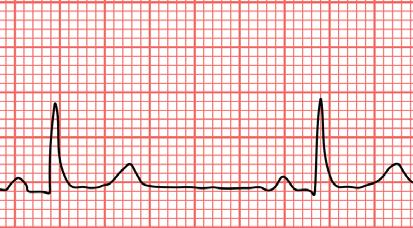

A racing heartbeat
Pounding in your chest
A slow heartbeat
A sense that your heart is fluttering or flip-flopping
Skipped heartbeats
or lightheadedness
of breath
or weakness
DEFIBRILLATOR: In
some patients, a related device called an automatic implantable cardioverter defibrillator (AICD) provides all the therapies a pacemaker provides but in addition can monitor the heart continuously and immediately correct the heartbeat when it detects a dangerous arrhythmia. “For people who need it and qualify, a defibrillator provides potentially lifesaving therapy,” Dr. Tardos says.
CARDIAC ABLATION:
“Certain arrhythmias result from an abnormal electrical circuit in the heart, where, under specific conditions, an irregular heartbeat develops that doesn’t stop on its own,” Dr. Tardos says. “We identify the crucial part of the circuit and basically use a form of cautery to make that tissue electrically inert so it doesn’t conduct. If you break the circuit, you cure the arrhythmia.” A state-of-the-art technique called cryoablation in the treatment of atrial fibrillation that uses cold instead of heat can reduce procedure time


and radiation exposure, with similar or better results.
REMOTE MONITORING:
“Modern cardiac implantable devices like loop recorders, pacemakers and defibrillators communicate with our office every night using Bluetooth technology so that abnormal findings can be recognized without the patient having to wait for the next scheduled visit,” Dr. Tardos says. “Remote monitoring has been shown to reduce hospitalizations and save lives.”
BIOMONITORING: “In patients who don’t have an implantable cardiac device, we offer a host of other monitoring options to keep track of patients remotely,”
Dr. Tardos says. Biomonitoring provides information not only on the heartbeat, but also on measures such as weight, blood pressure and blood glucose.
“Devices such as a special scale or blood pressure cuff sync with an app that

sends data to our office daily,” he says.
TELEMEDICINE: Cardiology



care can be more convenient and accessible when you see your doctor via video technology rather than traveling to a clinical office. “Telemedicine saves patients time and allows us to be more available,” Dr. Tardos says. “Often, we’ll learn of something through remote monitoring that we can then address in a quick telemedicine call.”
REFERRALS: When needed, MMCSC patients have access through RWJBarnabas Health to highly specialized care such as heart transplants, minimally invasive valve replacements and specialized devices such as the Watchman FLX, which can help prevent stroke from atrial fibrillation without the need for blood thinners. “MMCSC is a portal to all of the advanced therapies available throughout the system,” Dr. Tardos says.
To learn more about arrhythmias or to schedule an appointment with Dr. Tardos, call 732.840.0600 or visit www.rwjbh.org/doctors/jonathan-tardos-md .
•
•
•
•
•
• Dizziness
• Shortness
• Fatigue
Monmouth Medical Center Southern Campus RWJBH.ORG/MONMOUTHSOUTH 5
Clinical trials allow patients like Beth Lynch
potentially
latest cancer therapies and
to medical advances.
BENEFITING FROM CLINICAL TRIALS
Clinical trials can provide hope for those facing a difficult diagnosis.
RWJBarnabas Health (RWJBH), in partnership with Rutgers Cancer Institute of New Jersey—the state’s only National Cancer Institute-Designated Comprehensive Cancer Center—currently offers more than 200 clinical trials. These research initiatives study or test new medications, interventions and practices that may help control symptoms and side effects, in some cases investigating new ways of using available drugs.
Clinical trials offer patients a number of advantages. “When a patient enrolls, they’re not just joining forces with one doctor doing research on the latest treatments,” says Seth Cohen, MD, Regional Medical Director of Oncology Services, RWJBH Southern Region, and a member of RWJBarnabas Health Medical Group. “The patient actually gets an additional team of top doctors and nurses following their care in various ways.”

Patients may also receive new therapies that earlier research has shown to be appropriate for clinical use but are not yet broadly available. “You’re getting the benefit of cutting-edge research in advance of the general population,” says Trishala Meghal, MD, a medical oncologist at Monmouth Medical Center (MMC) and Monmouth Medical Center Southern Campus (MMCSC), and a member of RWJBarnabas Health Medical Group.

There’s another benefit as well: Participants play a meaningful role in improving cancer care for other patients. Two patients who took part in different clinical trials explain how their participation gives them hope for their diagnoses—and the future of medicine.
BOOSTING THERAPY
Around the time she turned 40 in 2021, Beth Lynch, Chief Executive Officer at Encompass Health Rehabilitation
 SETH COHEN, MD
SETH COHEN, MD
to
receive the
contribute
TRISHALA MEGHAL, MD
TWO PATIENTS DESCRIBE WHY PARTICIPATING IS IMPORTANT TO THEM—AND OTHERS. Healthy Together | 6 Fall 2022
Hospital, a joint venture with MMC, was diagnosed with stage 4 inflammatory breast cancer—an aggressive form of the disease characterized by abnormal swelling, redness and often a puckering of the breast’s skin.
“Cancer in general is scary enough,” says Lynch, who lives in Tinton Falls. “To then also be stage 4, your first question is, ‘How long do I have?’”
Lynch was fortunate. Her cancer was positive for the protein HER2, which responds to a number of treatments. This diagnosis also made her eligible for a clinical trial of a therapy that could further improve her odds against the disease.
Lynch was the first person in the country to be enrolled in the multisite clinical trial, which is investigating whether adding the medication tucatinib to existing drug protocols for her condition can prevent the cancer from spreading to the brain.
“With HER2-positive breast cancer, the chances of it recurring in the brain are quite high,” says Dr. Meghal. “Preventing that from occurring might allow us to give a patient other helpful, systemic therapies for a longer period of time.”
Tucatinib was previously approved for advanced forms of breast cancer. “We already know it’s an effective medication,” says Dr. Meghal. “We’re just providing it at an earlier point in treatment.”
To qualify for the trial, Lynch first had to undergo a course of chemotherapy, during which support from family members who flew from Washington State allowed her to continue working.
Lynch was then put on treatment for her cancer plus either tucatinib or a placebo. She won’t know which she is taking until after the trial ends, a practice that helps ensure accurate results.
“Selfishly, you hope you get the benefit of whatever they’re studying,” says Lynch, who has fared well on the regimen. “But [even if I’m receiving the placebo] it’s still worth it. There can’t be advances if we don’t have people willing to participate in clinical trials.”
A JUMP ON TREATMENT
In late 2019, John White, 68, an application engineer for an electronic security company in Ocean Township, began having occasional abdominal
cramps. “A couple of times, it felt like something was blocked,” he says.
Blood tests at a walk-in clinic revealed that White was anemic, or low in oxygen-carrying red blood cells. This finding combined with his symptoms prompted his doctor to schedule a colonoscopy.
The results weren’t encouraging: White was diagnosed with colon cancer. “I found out I had cancer on a Friday, and they did surgery the following Monday,” says White, who has two adult sons and several grandchildren. “My family was very worried.”
Further tests showed that the cancer had spread to White’s lung. He received 19 rounds of chemotherapy plus targeted therapies—treatments that selectively attack cancer cells without affecting normal cells.
Eventually, the cancer shrank, and blood levels of a tumor marker dropped. But levels started to rise again months later. “I’d been hoping I was out of the woods,” White says.
Dr. Cohen then suggested White enroll in a clinical trial designed to see if patients with metastatic colon cancer benefited from early use of a combination drug, trifluridine/tipiracil, which is typically added to treatment in patients like White later in the course of the disease. “In this trial, we’re doubling down earlier,” Dr. Cohen says.
White started taking the drug in November 2021. “We haven’t published the results yet, but this regimen appears to have great efficacy,” Dr. Cohen says. “We’ve enrolled a good number of patients in this study, and participants have had remarkable results, well above our expectations.”
White is in it for the long haul. “It’s been good all around,” he says. “I trust my doctor.”
RWJBarnabas Health and Monmouth Medical Center Southern Campus, in partnership with Rutgers Cancer Institute of New Jersey—the state’s only NCI-Designated Comprehensive Cancer Center—provide close-to-home access to the most advanced treatment options. Call 844.CANCERNJ or visit www.rwjbh.org/beatcancer.
Monmouth Medical Center Southern Campus RWJBH.ORG/MONMOUTHSOUTH 7
MODELS OF LEADERSHIP
SUPPORTERS ARE NAMED AS HONOREES FOR MMCSC’S MASQUERADE GALA.


Three key supporters of Monmouth Medical Center Southern Campus (MMCSC) were chosen to be honored as a highlight of the hospital’s October 22 Gala event. The honorees have long-standing histories of leadership and dedication to the local community. They are:
AVINASH GUPTA, MD

Dr. Gupta serves as Chief of Cardiology at MMCSC, with his wife, Geeta, practicing internal medicine at his side. The Lakewood community has benefited from his medical and leadership skills since he came to the area in 1994. The couple recently helped set up two COVID-19 clinics in India through a regional organization, and Dr. Gupta also has helped organize volunteers from the Monmouth and Ocean County Association of Physicians from India to assist in administering COVID-19 vaccines in Ocean County. Dr. Gupta’s commitment to health and well-being has been critical to ensuring that the local community has access to the best clinical care.
PINE BELT ENTERPRISES
The Pine Belt name has been a staple in the community for more than 80 years. Pine Belt Chevrolet has seen many changes since Leon Sickel opened his dealership in Lakewood in 1937. Since then, the family business has added other automotive brands, including Chrysler Jeep, Subaru, Nissan and Cadillac. Three generations of the Sickel family—Leon, David and Robert (left)—have provided area communities with unwavering support, including support for MMCSC, school districts and community events. Robert Sickel serves as Chairman of the MMCSC Foundation and a trustee of the Monmouth Medical Center/MMCSC Board. He has also made numerous gifts and has hosted events such as Flavors of the Jersey Shore, an October food-and-wine event that benefits services highlighted during Breast Cancer Awareness Month. His hard work and dedication have been a vital part of MMCSC’s success.
ALAN KRUPNICK

Now president of a family real estate investment and brokerage firm located in Lakewood, Alan Krupnick was licensed as a real estate broker in 1975 and has extensive experience in the acquisition, development and brokerage of vacant land, mainly in Ocean County. He serves on numerous community boards, including the MMCSC Foundation Board of Trustees. His support of MMCSC also includes a generous gift that commemorates his mother, Charlotte, known for her decades-long investments of time and dedication to the hospital and its Foundation, and honors his father, Sydney, and his longstanding legacy in the greater Lakewood community. The Krupnick family’s generosity has been critical to ensuring that the Ocean County area has access to the best clinical care.

CELEBRATING A THRIFT SHOP’S 1-YEAR ANNIVERSARY
When the Hidden Treasures
Thrift Shop opened last fall, it provided more than affordable clothing, household items, furniture, toys and other goods. Funds raised from the thrift shop— located at the Tri-City Plaza, 2360 Route 9, Toms River— provide valuable financial support to Monmouth Medical Center Southern Campus (MMCSC).
Examples of equipment purchased using net proceeds from the hospital thrift shop include a 15-person transportation van that brings scheduled patients to and from the hospital for outpatient appointments, a cutting-edge stereotactic breast biopsy with tomosynthesis system, an osteoporosis screening machine and temporal artery thermometers.
Hidden Treasures is staffed by volunteers six days a week, with Sunday hours once a month. A dedicated team of markers, floor volunteers, cashiers and daily managers are essential for the shop’s success. For more information, call the thrift shop at 732.364.6312

To support the Monmouth Medical Center Southern Campus Foundation, visit www.monmouthsouthgiving.org .
Healthy Together | 8 Fall 2022
The best kind of back support is spine care close to home. Do it right. Here.





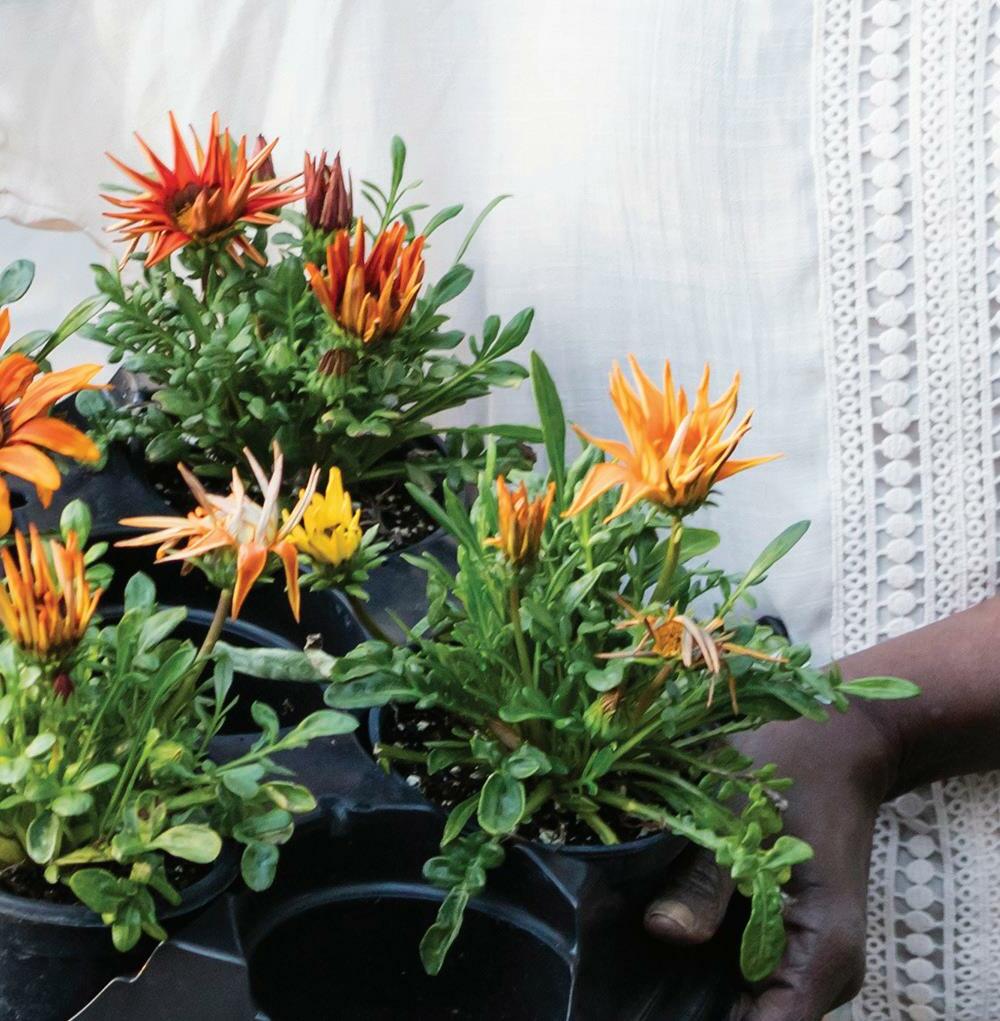










When you need treatment for spinal problems, even the thought of traveling out-of-state for care can be painful. At RWJBarnabas Health, our orthopedic surgeons and neurosurgeons work with you to create a personalized treatment plan, right in your own community. We offer non-surgical treatments in addition to the latest surgical techniques, such as reconstruction and minimally invasive robotic surgery. Learn more at rwjbh.org/spine


Find relief with our board-certified specialists just minutes away.
HOLIDAY BLUES?
HERE’S HOW TO COPE

Healthy Together | 10 | Fall 2022
WHY THE HOLIDAYS CAN BE AN EMOTIONAL MINEFIELD— AND WHAT YOU CAN DO TO HELP KEEP NEGATIVE EMOTIONS AT BAY
The days are getting shorter, the weather’s getting cooler and soon the holidays will be here. For some of us, the weeks and months leading up to the holiday season are filled with eager anticipation. But for many others, this time can be an emotional minefield fraught with crippling anxiety and depression. Here, psychiatrist Arnold Williams, MD, Medical Director of the Behavioral Health Center, part of RWJBarnabas Health’s Behavioral Health and Addictions Services, explains the link between the holidays and depression—and offers advice to help you cope.
Why do people get depressed around the holidays?
The holidays coincide with late fall and winter, when exposure to sunlight is decreased. This can have a profound effect on mood. In addition, many businesses slow or even shut down during the holidays, and, for some, that may mean fewer opportunities for social interaction.
Do the holidays tend to exacerbate existing depression?
The holiday season is a time of reflection and gift-giving, which can be rewarding for those in fortunate circumstances. However, isolation, separation from loved ones and anniversaries of loss can all worsen depression.
What’s the difference between being depressed and simply feeling sad?
7 WAYS TO COUNTERACT HOLIDAY DEPRESSION
According to RWJBarnabas psychiatrist Arnold Williams, MD, there are things you can do to mitigate depression:
1. Maintain contact with friends and family, if possible.
2. Get as much natural sunlight as you can.
3. Exercise—walk, run, move.
4. Practice yoga, mindfulness and meditation. They work!
5. Recognize that this too shall pass. You’ve survived all of the bad days you’ve had so far— that’s proof that things can get better again.
6. Don’t try to ease the pain with substances; it will compound the problem.
7. Know that you’re not alone. Reach out to a professional who can help you.

patterns and reduced self-esteem. At its most extreme, depression can include suicidal thoughts or feelings of not wanting to be alive.
Do depression and anxiety always go hand-in-hand?
They can happen together or separately. Philosophically, depression and anxiety are two sides of the same coin. Anxiety is an anticipatory “what if” reaction, dreading the unknown and fearing the worst. Depression is a conclusion that the worst is happening right now and may not ever get better.
ARNOLD A. WILLIAMS, MD

Depression implies a wide constellation of symptoms over several days or weeks. The emotion itself is only one component. Most commonly, that emotion is sadness, but there can also be anger, loneliness, worry or anxiety, as well as changes in thoughts and behaviors. Examples include losing interest in things you usually enjoy, a decrease in energy, changes in appetite or sleep
How does grief impact depression and vice versa? Grief can be a trigger for a relapse in depression, and a person who’s been depressed may experience a prolonged grief period. The holidays are difficult partly because they’re usually connected to memories of a lost loved one.
If you or a loved one are in need of mental health treatment, call our Access Center, open 24 hours a day, at 1.800.300.0628 to learn more about your mental health options or visit www.rwjbh.org/behavioralhealth .
RWJBarnabas Health | RWJBH.ORG | 11
HELPING YOU NAVIGATE YOUR CANCER JOURNEY
Being diagnosed with cancer is life-changing. It can have a profound effect on your psyche, leaving you feeling frightened, confused and overwhelmed. At the same time, you need to make calm, clear and timely decisions about important matters such as doctors and treatment options.
That’s why RWJBarnabas Health (RWJBH) and Rutgers Cancer
Institute of New Jersey, the state’s only National Cancer InstituteDesignated Comprehensive Cancer Center, developed the Oncology Nurse Navigation Program.
For a person with cancer, a nurse navigator is not just a valuable resource, but a smiling face and a caring individual to help you and your family maneuver the often uncharted territory of your cancer journey.

ONCOLOGY NURSE NAVIGATORS OFFER COMPREHENSIVE SUPPORT AND SERVICES TO PATIENTS AND THEIR CAREGIVERS.
Healthy Together | 12 | Fall 2022
Jeanne Silva, MSN, RN-BC, Assistant Vice President, Oncology Access and Nurse Navigation, Oncology Services, explains what the Oncology Nurse Navigation Program is and how it works.
What does the Oncology Nurse Navigation Program do?
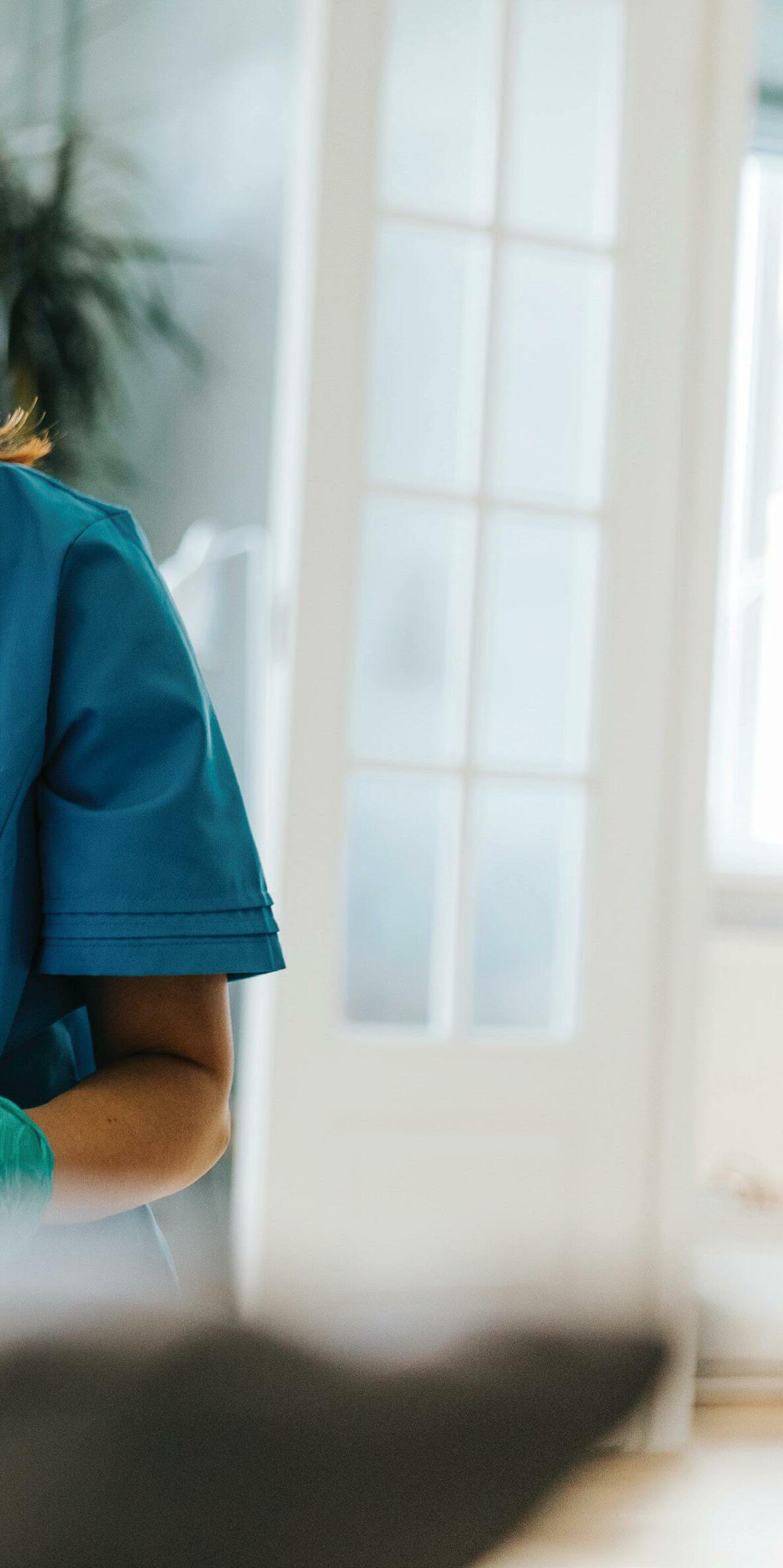
If you’re diagnosed with cancer and are a patient at RWJBH, the program
EACH NAVIGATOR BRINGS A WEALTH OF KNOWLEDGE, ENERGY AND EMPATHY. YOU’RE UNIQUE WITH YOUR OWN STORY, AND THE NAVIGATOR IS THERE TO LISTEN AND HELP.
places an expert at your side who advocates for you and provides direction, support and information through all phases of treatment at no additional charge. The nurse navigator is the hub of your care team, communicating your needs across departments and answering your questions about what to expect, what to do, where to go and why. Having a trusted, committed expert guiding
you helps you participate fully in treatment decisions, achieve quality outcomes and reduce stress.
When was the program developed, and how has it changed since its inception?
The RWJBH nurse navigation program began in 2018 with 18 navigators. Today we have 45 navigators and are growing. Oncology nurses receive navigationspecific training as well as ongoing education to improve care through measures such as shortening the time between diagnosis and meeting with an oncologist and improving access to palliative care.
Our program is the state’s largest. We routinely conduct quality improvement projects and have presented our outcomes nationally to share best practices. We are one team across our facilities. If you see an oncologist from Rutgers Cancer Institute, for example, but want to receive radiation therapy closer to home or need to see an RWJBH subspecialist, we help coordinate your care seamlessly between sites.
What are some benefits that patients might find surprising?
You’re quickly assessed for any barriers to care and provided resources to overcome them. Barriers often include lack of knowledge, transportation difficulties and financial hurdles. Helping you ease worries allows you to focus on getting well. One aspect is that anxiety and fear of the unknown sometimes prevent people from starting potentially life-saving treatments. We’ll assess this and provide support so you can get the right care. Or, for example, if you’re a candidate for a clinical trial, the navigator can educate you about that and connect you with a research team.
Each navigator brings a wealth of knowledge, energy and empathy. You’re unique with your own story, and the navigator is there to listen and help.
RWJBarnabas Health, in partnership with Rutgers Cancer Institute of New Jersey—the state’s only NCI-Designated Comprehensive Cancer Center—provides close-to-home access to the most advanced treatment options. Call 844.CANCERNJ or visit www.rwjbh.org/beatcancer.
RWJBarnabas Health | RWJBH.ORG | 13
ONE STEP AT A TIME
SPINA

Healthy Together | 14 | Fall 2022
BIFIDA COULDN’T STOP LITTLE NIKOS. THE TEAM AT CSH WOULDN’T LET IT.
Nikos Kaymakcian is a happy little boy who loves pirates and practicing karate with his older brother, Arman. As he approaches his fourth birthday, his parents, Nicole and AJ Kaymakcian, can’t help but wonder how their lives might be different if they hadn’t sought a second opinion when Nicole was pregnant with Nikos. It was then, at their 20-week ultrasound, that Nicole and AJ were told that their son has spina bifida, a neural tube defect (NTD) that often results in spinal cord and nerve damage. “The doctor told us that our son would never walk or be able to use the bathroom on his own and would require a shunt to drain fluid from his brain,” Nicole recalls. In one fell swoop, their hopes and dreams for their baby came crashing down.
But a friend whose child had received a similar diagnosis recommended that

Nicole contact her neurosurgeon for a second opinion. After examining Nicole and her baby, the doctor told Nicole to go home and enjoy her pregnancy. “He said, ‘When your son is born, we’ll do surgery and take it from there,’” she remembers. And that’s what happened.
In October, 2018, Nicole gave birth to Nikos at Monmouth Medical Center, and the neurosurgeon performed the baby’s surgery the following day. Before his first birthday, Nikos began early intervention with physical therapy at Children’s Specialized Hospital (CSH), part of the Children’s Health Network
at RWJBarnabas Health.
CSH physical therapist Tara Iannello, who has been working with Nikos since then, “is an angel,” says Nicole. Nikos also works with physical therapist Natalie Vulpis. “She gives Nikos a push when he doesn’t want to do something and has also been a great fit for him,” says Nicole.
The CSH physical therapists go out of their way, not only to provide great care, but to customize it and make it fun. “Last year, Nikos loved superheroes,” says Nicole, “so Tara set up superhero action figures in stations so he had to practice walking to each one.”
Though Nikos has some weakness in his ankles and feet due to nerve damage, he’s on par with all other milestones for his age and, says his mom, “he’s now walking with braces and his walker, taking steps on his own.



“I can’t say enough good things about what the people at CSH have done for my son. We’re so blessed.
We love them with all our heart.”
The feelings are mutual. “He’s such a sweet and funny kid, and he’s gotten so strong,” Iannello says of Nikos. “We have no doubt that he’s going to do great things in this world.”
Clifton, East
and West Orange.
RWJBarnabas Health | RWJBH.ORG | 15 Thanks to the dedicated care and support of his physical therapists (previous page) at CSH, the love of his parents and his own indomitable spirit, Nikos Kaymakcian, who was born with spina bifida, continues to make great strides. To learn more about outpatient programs and services at Children’s Specialized Hospital, visit rwjbh.org/cshoutpatient or call 888.244.5373
At Children’s Specialized Hospital, we provide world-class care for children and young adults who face special health challenges across the state of New Jersey and beyond. We treat everything from chronic illnesses and complex physical disabilities, like brain and spinal cord injuries, to a full scope of developmental, behavioral and mental health concerns. We have convenient locations throughout the state: Bayonne,
Brunswick, Eatontown, Egg Harbor Township, Hamilton, Jersey City, New Brunswick, Newark, Somerset, Toms River, Union
THE LOWDOWN ON LOW-DOSE ASPIRIN
WHAT YOU NEED TO KNOW ABOUT THE LATEST GUIDELINES FOR HEART ATTACK AND STROKE PREVENTION
For years, taking a daily low-dose aspirin for the prevention of heart attack and stroke has been a widely accepted practice. But the U.S. Preventive Services Task Force (USPSTF) recently issued updated guidelines recommending against its use in certain patients for primary prevention of heart disease. Here, cardiologist Jeffrey S. Lander, MD, Co-Director of Sports Cardiology at RWJBarnabas Health, Co-Medical Director of the Cardiac Care Unit at Cooperman Barnabas Medical Center and a member of RWJBarnabas Health Medical Group, explains.
How are the new guidelines different from the previous guidelines?
This is a big change from the 2016 guidelines, which recommended using aspirin for primary prevention in adults aged 50 to 59 who were at risk for cardiovascular disease, and to consider its use for certain adults aged 60 to 69 who were at risk for cardiovascular disease.
What prompted these new recommendations?
recent stent procedure. If someone has that history, it’s generally beneficial to take a low-dose daily aspirin as it helps reduce the risk of recurrent cardiac disease or events.
If someone has been following a lowdose aspirin regimen for years, what should they do?
JEFFREY S. LANDER, MD

The 2022 guidelines state that using aspirin in select 40to 59-year-olds may have some benefit in preventing heart disease, but it is not recommended for people aged 60 and older.
Older trials of aspirin use for primary prevention showed benefits—for example, reduction in heart attacks. However, more recent studies did not show a significant reduction in cardiovascular disease. In addition, many of these trials also showed significant risk of internal bleeding among those taking daily aspirin. Given these findings, the recommendations changed.
Are there exceptions to the new guidelines?
It’s very important to remember that these recommendations don’t pertain to patients with a prior history of heart attack, stroke, bypass surgery or a
In that case, it’s important that they speak to their doctor or healthcare provider before making any changes. All of the risks and benefits should be weighed prior to stopping aspirin. Most of the time when aspirin is to be stopped, it’s OK to simply stop; a stepdown approach isn’t needed.
How will the new guidelines change your recommendations to patients?
I feel that most of the latest evidence is in support of the new guideline recommendations.
Each patient is unique, and when recommending to either use or not use aspirin for primary prevention of heart disease, the risks and benefits should be discussed and weighed by doctor and patient to make an individualized plan.

Whoever your heart beats for, our hearts beat for you. To connect with a top cardiovascular specialist at RWJBarnabas Health, call 888.724.7123 or visit www.rwjbh.org/heart
Healthy Together | 16 | Fall 2022
CONNECTED TO THE COMMUNITY
EXPERTS FROM MONMOUTH MEDICAL CENTER SOUTHERN CAMPUS REACH OUT TO HELP ACHIEVE BETTER HEALTH IN THE COMMUNITY THEY SERVE.

Four pillars of wellness are guideposts for healthy living—and for the Better Health Program at Monmouth Medical Center Southern Campus (MMCSC). The pillars are:
• Socializing
• Movement
• Nutrition
• Health education
MMCSC health experts recently drew on the social aspect of wellness by teaming up and bringing their knowledge back into the community through a number of live events. Their goal was to promote the other pillars—offering education about health and wellness along with the benefits of physical activity and good nutrition.
In one event, MMCSC’s health experts took it on the road to Westlake Golf and Country Club, an over-55 community in Jackson. More than 56 residents heard a presentation on brain

health from a panel of guest speakers that featured Abhijit Chatterjee, MD, geriatric medicine specialist at MMCSC’s James and Sharon Maida Geriatrics Institute and a member of RWJBarnabas Health Medical Group; Jennifer Klein, MS, RDN, registered dietitian nutritionist at MMCSC and Monmouth Medical Center; and Kenneth Zaentz, CFRE, President and Chief Executive Officer of Alzheimer’s New Jersey.
In another event, MMCSC’s outreach team hosted a Ladies’ Night Out at Leisure Village, a residential community for active adults 55 and over in Lakewood. More than 80 female residents engaged in an interactive evening that included a panel of MMCSC clinical experts discussing vital women’s health issues.
MMCSC’s Community Health and Social Impact and Community Investment team not only hosted several
MARKING NATIONAL WALK TO SCHOOL DAY
Each October, many children across the country trek to school using their own two feet on National Walk to School Day, held this year on October 5. MMCSC’s Community Health and Social Impact and Community Investment team works closely with local schools to promote pedestrian safety by offering inperson safety seminars and visuals such as the storybook Clifford Takes a Walk Educating families about potential hazards helps children get more exercise by walking or biking to school while staying safe.

Speaking at a recent community event were (from left) Abhijit Chatterjee, MD, geriatric medicine specialist at MMCSC’s James and Sharon Maida Geriatrics Institute and a member of RWJBarnabas Health Medical Group; Anupama Sunkavalli, MD, an obstetrician/ gynecologist at Community Medical Center and a member of RWJBarnabas Health Medical Group; Anil Gupta, MD, Chief Medical Officer at MMCSC; Richard S. Lazzaro, MD, Chief of Thoracic Surgery for RWJBarnabas Health’s Southern Region; and Stephanie Ng, MD, a breast surgeon at MMCSC and a member of RWJBarnabas Health Medical Group.
guest speakers, but also offered vendors, food and cancer services information.
Looking for a Better Health presentation in your community club or organization? Call the Community Health and Social Impact and Community Investment team at 732.597.6075 for details.
At a recent community event on brain health were (from left) Jennifer Klein, MS, RDN, registered dietitian nutritionist at MMCSC and Monmouth Medical Center; Abhijit Chatterjee, MD, geriatric medicine specialist at MMCSC’s James and Sharon Maida Geriatrics Institute and a member of RWJBarnabas Health Medical Group; and Kenneth Zaentz, CFRE, President and Chief Executive Officer of Alzheimer’s New Jersey.
Monmouth Medical Center Southern Campus | RWJBH.ORG/MONMOUTHSOUTH | 17
A team helping Barry Sutton (second from right) overcome foot wounds includes (from left) Tracy Redstone; Cheryl Munroe, BSN, RN, CCM; Matthew Modugno, DPM; Rebecca Cortez, LPN; and Deonna Youn, LPN.
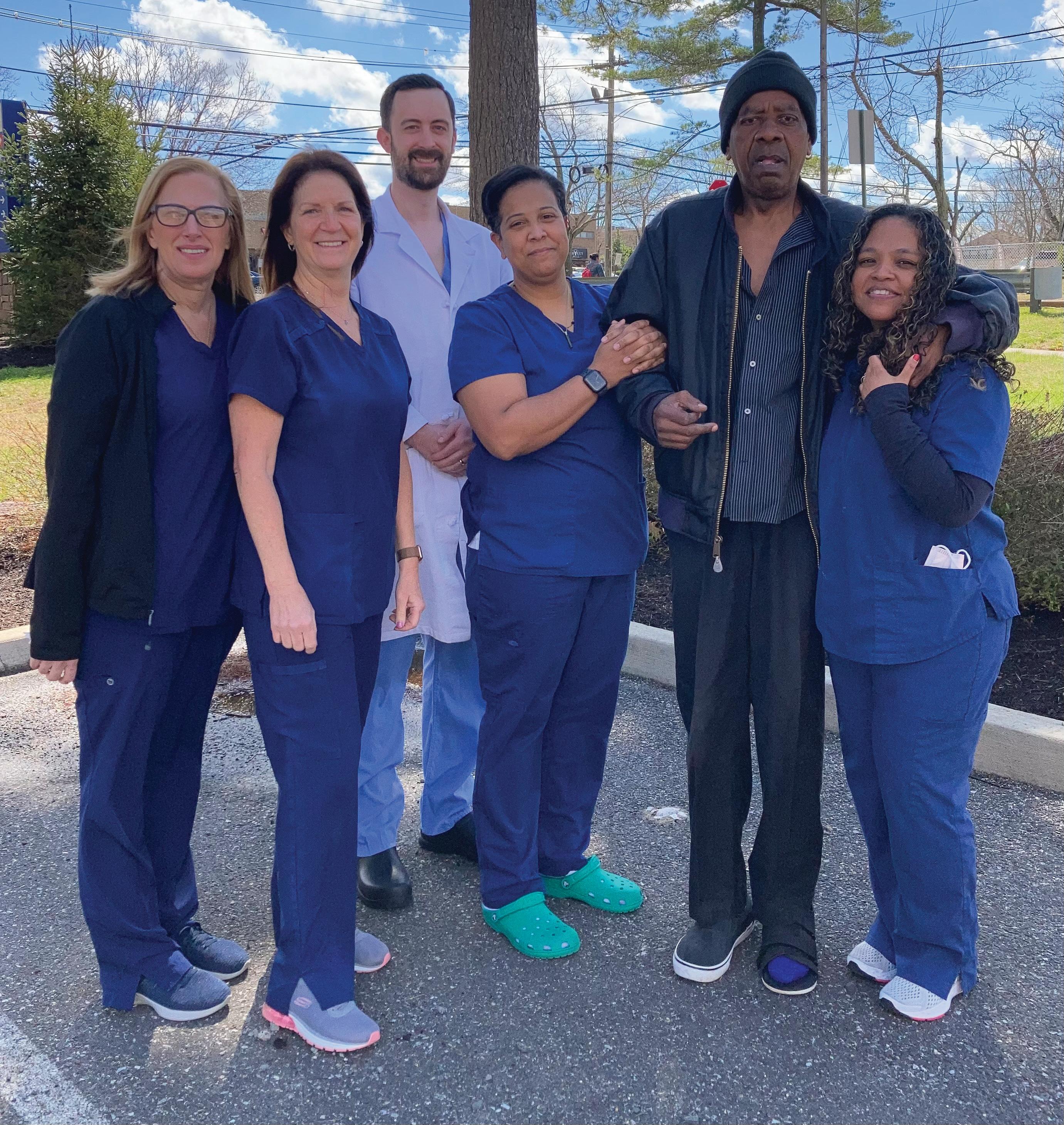
WOUND
CENTER
‘THE
CARE
GOT ME THROUGH THIS’ SPECIALIZED CARE HELPS A MAN WITH DIABETES RECOVER FROM SEVERE INFECTIONS AND WOUNDS. Healthy Together | 18 | Fall 2022
Barry Sutton of Lakewood knew he had diabetes. But he didn’t realize how extreme the disease’s complications could become. In September 2021, his blood sugar was out of control. But it’s the nature of diabetes that symptoms often go unnoticed until they become severe.
Sutton’s cousin was the first to sound an alarm. Sutton had mentioned he was having foot pain while they were together one weekend. “She said, ‘You better get that checked out,’” he says.
When he took her advice, his doctor pointed out something alarming. “He noticed my little toe was kind of black,” Sutton recalls. “He said I should go to the hospital.”
THREATENING WOUNDS
At Monmouth Medical Center Southern Campus (MMCSC), doctors understood immediately what was happening. “He had a severe, aggressive diabetic foot infection,” says Matthew Modugno, DPM, a podiatrist at MMCSC. “It was very significant and could have progressed to a limb- or even lifethreatening situation.”
It was already too late to save two of Sutton’s toes. The day he came to the hospital, Amanda Crowell, DPM, a podiatrist at MMCSC, performed surgery to amputate Sutton’s fourth and fifth digits, along with a portion of the metatarsal bones behind each toe.
“I’m lucky,” Sutton says. “You have to look at it that way. I lost two toes, but there’s always somebody in worse shape than you. You just have to keep going.”
In addition to his infected toes, Sutton had a large wound on his heel. He needed to not only control infection but also heal the wound and address the underlying problems that were wreaking havoc with his lower extremities.
Removing the severely infected toes was just the start of Sutton’s long journey back to more stable health. “We threw a wide variety of services into the battle, including teams addressing internal medicine, infectious disease,
WHY IS DIABETES SO DANGEROUS?
Having diabetes seems a far cry from needing a toe or leg removed.
wounds and infections severe enough to require amputation can
an unfortunate consequence of having poorly controlled blood sugar.
Diabetes is a chronic disease that occurs when the body has trouble producing or responding to the hormone insulin, which delivers blood sugar, or glucose, into cells for energy. If the body can’t use enough insulin, glucose builds in the bloodstream.
High blood sugar can increase risks for a variety of serious complications. These include heart attack and other forms of cardiovascular disease, nerve damage and circulation problems. Poor circulation and nerve damage can make feet vulnerable to wounds and sores that can quickly get worse and often have difficulty healing.
cardiology, interventional cardiology and wound care,” Dr. Modugno says.
EXTENSIVE TREATMENT
Tests including X-rays, MRI scans and studies of Sutton’s blood flow revealed that his problems were extensive. A few days after his first surgery, he underwent a second surgery to remove more bone along with dead or nonviable tissue in hopes of further controlling infection, closing the surgical site and helping his wounds heal.
In a technique called negative pressure therapy, a vacuum device helped draw fluid from Sutton’s wounds and increase blood flow to the area. “Negative pressure basically encourages wound healing from the bottom up and helps make the base of the wound healthier,” Dr. Modugno says. “You don’t want a deep, wide-open space.”
Within days, Sutton also had a vascular procedure that opened up blocked blood vessels in his leg to improve circulation. All told, he was in the hospital for more than a week.
But Sutton’s care didn’t end with his discharge. He continued to receive skilled wound care and extensive treatment at MMCSC’s Center for Wound Healing and Hyperbaric Medicine.
Samples of bone removed during surgery found he had a residual bone infection, so he went home with a PICC (peripherally inserted central catheter)
line that allowed him to receive infusions of intravenous antibiotics for six weeks. “We also quickly evaluated him for hyperbaric oxygen [HBO] therapy, which is indicated for diabetic foot wounds and bone infection,” Dr. Modugno says.
HBO therapy entails lying in a pressurized chamber to receive pure oxygen that helps fight bacteria and heal wounds. Sutton went through dozens of sessions, each lasting two hours or more. “Some people couldn’t stand to be closed in,” Sutton says. “But the staff at the wound care center kept me occupied or helped me laugh or watch TV to get me through. They’re good people over there.”
For months, Sutton came in regularly to have wounds cleaned and bound with a variety of dressings. He also was fitted with orthotic shoes. “It’s very important to have proper shoes that accommodate the new foot structure and properly distribute pressure to reduce the chances of recurrence,” Dr. Modugno says. Compression socks help improve Sutton’s circulation.
Sutton’s wounds gradually healed, and his visits became less frequent. “Eventually, he was wound-free, had no evidence of infection and was able to independently walk on his own,” Dr. Modugno says. By spring 2022, Dr. Modugno was down to seeing Sutton monthly.
“It could have been worse,” Sutton says. “The wound care center got me through this. They really took care of me.”
To learn more about treatment at the Center for Wound Healing and Hyperbaric Medicine at Monmouth Medical Center Southern Campus or to make an appointment, call 732.886.4100 .
But
be
Monmouth Medical Center Southern Campus | RWJBH.ORG/MONMOUTHSOUTH | 19
‘SHE’S ONE OF A KIND’
 Gerry Byrnes (seated), with Melanie Vernacchia, MSN, APN, OCN (standing), holds a photo of his wife, Joan.
Gerry Byrnes (seated), with Melanie Vernacchia, MSN, APN, OCN (standing), holds a photo of his wife, Joan.
GERIATRIC CARE AND A SPECIAL RELATIONSHIP HELP A MAN CARE FOR HIS WIFE—AND HIMSELF. Healthy Together | 20 | Fall 2022
An emergency call had gone out to staff at Monmouth Medical Center Southern Campus (MMCSC): A patient was having trouble breathing. “All these people descended on the room,” says Gerry Byrnes, 87, of Brick. “I’d never seen so many people crowded in the hallway.”
Gerry was visiting his wife of 44 years, Joan, who was in the hospital in late 2021 for pneumonia complicated by ongoing health issues including heart failure and chronic obstructive pulmonary disease (COPD). She began having respiratory distress that lowered her oxygen intake.
Among the providers who rushed to Joan’s room was Melanie Vernacchia, MSN, APN, OCN. A nurse practitioner specializing in geriatrics and palliative care, Vernacchia is Clinical Director of MMCSC’s James and Sharon Maida Geriatrics Institute. “Melanie knew Joan better than any provider in that room,” Gerry says.
Familiarity is typical for Vernacchia when working with older patients. “My general approach is to address the patient as an individual and provide individualized care based on the person’s goals, wishes and wants,” she says. “I try to look at the whole person and not just their diagnoses.”
That entails getting to know not only patients but also patients’ families. “Joan’s favorite thing to drink was root beer,” Vernacchia says. “I don’t know if any doctor would know that.”
hadn’t seemed to consider. “Joan had so many ailments that Gerry put himself on the back burner all the time,” she says. “I said to him, ‘You need to take care of yourself as well—otherwise, how are you going to take care of her?’” It was a persuasive argument: Gerry also became Vernacchia’s patient at the institute and began coming in at least annually for a checkup.
But the focus for both Gerry and Vernacchia remained on Joan, who steadily declined and eventually required the use of a wheelchair. Mishaps around the house led to injuries to Joan’s lower legs that proved difficult to heal. “I started making house calls so that she didn’t have to come all the way in to the hospital,” Vernacchia says.
“Melanie was always available,” Gerry marvels. “She gave me her personal number and wanted me to know I could call. She’s one of a kind.”
“MY GENERAL APPROACH IS TO ADDRESS THE PATIENT AS AN INDIVIDUAL AND PROVIDE INDIVIDUALIZED CARE BASED ON THE PERSON’S GOALS, WISHES AND WANTS.”
Joan’s respiratory emergency quickly passed. “As a primary caregiver, I was able to assist in creating a care plan for her that day,” Vernacchia says. “But I think my presence also helped her relax and overcome this hiccup during her hospital stay.”
Melanie Vernacchia, MSN, APN, OCN
DIFFICULT CONVERSATIONS
Gerry felt the COVID-19 pandemic accelerated Joan’s decline. “Not being able to go anywhere or do anything caused a slow loss of muscle and ability to maneuver,” he says. When lockdowns eased, Vernacchia encouraged Joan to attend a Thanksgiving family reunion in New York’s Catskills region. “She had been hemming and hawing about going due to her health,” Vernacchia says. “But she went and thanked me afterward. She held on to those moments with her children, grandchildren and two great-grandsons.”
COMPASSION AND UNDERSTANDING
Gerry and his wife first met Vernacchia when they moved to Brick from the Cape May area in 2017. They came to the James and Sharon Maida Geriatrics Institute to find medical care geared to older adults. “It became a very delightful relationship,” Gerry says.
In addition to heart and lung issues, Joan, then 88, also had battled arthritis since her 50s. Over the years, she’d had joint replacements in both hips and both shoulders. “I helped her manage various issues,” Vernacchia says. “Over time, her orthopedic problems continued to worsen, but with COPD and her overall age, she wasn’t a candidate for any further surgeries.”
“Melanie is very compassionate and understanding,” Gerry says. “She never would express her own feelings about care until she heard the whole story of how we felt and what we thought. She’d listen, take notes and then make her recommendations.”
At one point, Vernacchia spoke up about something Gerry
Vernacchia is experienced in end-of-life care and recognized the family could benefit from some healthy but difficult decisions. “She mentioned hospice a few times, but we obviously weren’t wanting to think about it,” says Joan’s daughter Sheila Rothschild. “She explained it in a beautiful way—that it wasn’t like Mom would pass away the next day, but we should do our best to prepare ourselves. Melanie always had a calm and thoughtful way about her, and she made some very good points.”
With Vernacchia’s help, Joan and the family decided not to seek hospital care that might not significantly prolong or improve her life but to remain at home surrounded by familiar comforts and the love of family. Joan passed away at age 93 in January 2022.
“She had a good life,” Gerry says, recalling how together they saw all 50 states—many of them during a six-week road trip in 2000.
In the spring, he went to the James and Sharon Maida Geriatrics Institute for his annual physical. “When I showed up, the staff said they were so sorry about Joan and gave me a hug,” he says. “When you lose someone, a wife of 44 years, just a meaningful hug brings tears to your eyes. The whole staff is considerate and caring in that way.”
To learn more about the James and Sharon Maida Geriatrics Institute at Monmouth Medical Center Southern Campus, call 732.886.4700 or visit www.rwjbh.org/monmouthgeriatrics .
Monmouth Medical Center Southern Campus | RWJBH.ORG/MONMOUTHSOUTH | 21
Diane Savino, 88, loves walking along the beach near her home in Manchester. But for years, these strolls were painful due to two problems with her left foot. It would take two decades and the help of a doctor at Monmouth Medical Center Southern Campus (MMCSC) to make ambles on the shore—or anywhere else— comfortable again.

One of Savino’s issues, misalignment of her left big toe, arose in 2002 following surgery to remove a bunion. The bunion had made her toe veer left and cross over painfully to her second toe. After surgery, the toe
TAKING A GIANT STEP FORWARD
A WOMAN PLAGUED WITH FOOT PROBLEMS FOR YEARS FINALLY RECEIVES PROPER CARE.
Replacement (STAR Ankle), an operation that swaps an arthritic ankle joint with an implanted prosthetic. “I thought, ‘If he’s so good that he’s doing the STAR Ankle, maybe he can help me,’” she says. She visited his office in February 2022.
PERSONAL CARE
X-rays found that previous attempts to fix Savino’s hammertoes had actually made them worse. “Her third toe looked like it was making a 90-degree turn to the left,” Dr. Prasad says.
But he had a solution: “We’d go into her toes, remove some bone and put in small implants that would hold the toes in a corrected position,” he says.
Savino appreciated Dr. Prasad’s expertise and detailed description of the outpatient procedure he wanted to perform to address her condition. “He explained everything clearly, so I knew what to expect,” she says. She also appreciated the friendliness of the healthcare professionals at her preop screening a few weeks later. “We chatted,” she says. “They were low-key and not rushed.”
overcorrected and pointed inward. “I couldn’t put certain shoes on and had to wear soft sneakers,” Savino says.
The other problem, a condition known as hammertoes, had her second through fifth toes bent upward at their middle joint. Hammertoes make walking painful because the tops of the toes rub against a person’s shoes.
Over the next 20 years, Savino saw several doctors and had six more surgeries aimed at correcting her foot problems. Five were unsuccessful; the sixth realigned her big toe but didn’t fix her hammertoes.
Finally, in early 2022, an internet search for the best local foot surgeons called her attention to Manooj Prasad, DPM, Chief of Podiatry at MMCSC. Savino noted he was among the few who perform the Scandinavian Total Ankle

Savino underwent the procedure, called an arthrodesis, at MMCSC on April 5. A complimentary hospital shuttle service provided her with a ride home just hours after the operation was completed. After seven weeks of recovery in a boot and later a surgical shoe, she was wearing normal footwear of her choice and walking pain-free.
Having experienced multiple foot surgeries, Savino came away impressed. “You usually don’t see much of the doctor except for the initial diagnosis and planning—you see techs and nurses,” she says. “But Dr. Prasad did everything. Whether consulting, bandaging my foot or taking out stitches, I always felt like his mind was on me and me alone.”
Savino is now back to her favorite pastimes, including, of course, shoreline strolls. “I had prayed, ‘Send me to the right doctor, Lord, please,’” she says. Her prayer was finally answered in finding Dr. Prasad.
To learn more about same-day surgery at Monmouth Medical Center Southern Campus, call 732.886.4533 or visit www.rwjbh.org/mmcscsurgery .
MANOOJ PRASAD, DPM
Outpatient surgery at Monmouth Medical Center Southern Campus resolved Diane Savino’s uncomfortable hammertoes. Healthy Together | 22 | Fall 2022
that a woman will
breast
3.8
The number of breast cancer survivors in the
are
BREAST CANCER SCREENING SAVES LIVES. HERE’S WHAT YOU NEED TO KNOW. MAMMOGRAM? DO YOU NEED A
EASY ACCESS TO BREAST SCREENING SERVICES
The Jacqueline M. Wilentz Comprehensive Breast Center provides screenings and access to care at four community locations.
MONMOUTH MEDICAL CENTER
SOUTHERN CAMPUS
600 River Avenue Lakewood, NJ 08701 Sunday appointments available.
MONMOUTH MEDICAL CENTER
300 Second Avenue Long Branch, NJ 07740
THE JACQUELINE M. WILENTZ BREAST CENTER AT HOWELL
4013 Route 9 North, Suite 2S,
The Aldrich Plaza Howell, NJ 07731
THE JACQUELINE M. WILENTZ BREAST CENTER AT COLTS NECK
310 Route 34 South, Second Floor Colts Neck, NJ 07722
WHEN SHOULD YOU GET SCREENED?
to
55 and older
Continue yearly screening or switch to every other year if warranted. Talk with your doctor about what’s
IF
HIGH-RISK:
Women at especially high risk for breast cancer
family
personal
earlier age
To learn more about breast cancer or to make an appointment at the Jacqueline M. Wilentz Breast Center, call 732.923.7700 . RWJBarnabas Health and Monmouth Medical Center Southern Campus, in partnership with Rutgers Cancer Institute of New Jersey—the state’s only NCI-Designated Comprehensive Cancer Center—provide close-to-home access to the most advanced treatment options. Call 844.CANCERNJ or visit www.rwjbh.org/beatcancer.
BREAST CANCER BY THE NUMBERS The chance
develop
cancer in her lifetime 1 IN 8
40
54 Get a mammogram every year.
due to factors such as
or
history should begin regular screening at an
determined in consultation with your physician.
YOU’RE
U.S. Breast cancer death rates
dropping, thought partly due to early detection. MILLION
right for you. Monmouth Medical Center Southern Campus | RWJBH.ORG/MONMOUTHSOUTH | 23
Harrisburg, PA
#324600 River Ave., Lakewood, NJ 08701
Your family has no history of breast cancer. You still need a mammogram.










It’s curious how healthy habits can become go-to excuses. excuse yourself from getting a mammogram. At Monmouth Center Southern Campus, we offer the latest in comprehensive health services including screening and diagnostic mammography, genetic testing, breast biopsy, breast surgery and more — of mind. And with breast health centers conveniently located Monmouth and Ocean Counties, finding us is simple, too.
Medical breast more like in
































Making excuses is easy. Making an appointment is easier. Schedule your visit to the Jacqueline M. Wilentz Breast Center at rwjbh.org/mammo
Let’s beat breast cancer together.


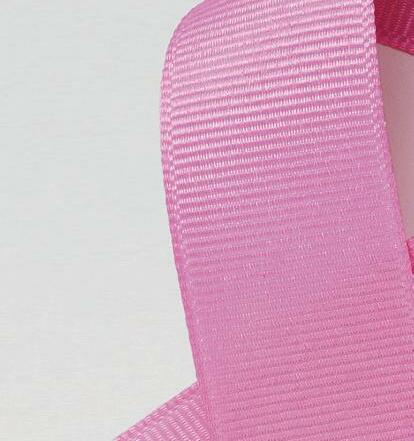

NON PROFIT U.S. POSTAGE PAID
Permit

























 SETH COHEN, MD
SETH COHEN, MD








































 Gerry Byrnes (seated), with Melanie Vernacchia, MSN, APN, OCN (standing), holds a photo of his wife, Joan.
Gerry Byrnes (seated), with Melanie Vernacchia, MSN, APN, OCN (standing), holds a photo of his wife, Joan.







































